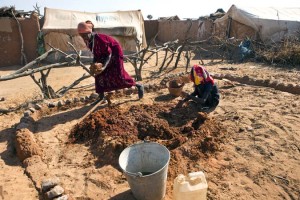Rethinking refugees’ potential
Busting myths of refugee laziness and passivity, researchers from Oxford University’s Migration Observatory have demonstrated how refugees contribute to the development of a prospering and successful economy.
While it is a common misconception that refugees living within refugee camps are lazy and unwilling or unable to contribute to economic prosperity, the Oxford report contradicts this stereotype, using evidence found by conducting surveys within refugee camps in Uganda.

Nakivale refugee camp, in Uganda
At Nakivale, Uganda’s largest and oldest refugee settlement camp, for instance, distinct markets have been set up by refugees, selling products ranging from food to jewellery to electronics.
In Nakivale, just one per cent of refugees are unemployed, according to the Oxford report. Somali refugees primarily run the markets at the Base Camp of Nakivale, while Congolese, Rwandan and Burundian refugees grow crops at the camps.
Refugees are also remaining technologically up-to-date, with the use of mobile phones and the internet predominant and integral to the daily lives of refugees in Uganda. Despite hurdles, such as remote geographic locations, up to 89 per cent of refugees are using their mobile phones to operate and conduct business ventures.
The network that these markets create is expansive, as “refugee farmers are linked to national and even sub-regional supply chains of agricultural production”, as the report says.
And refugees are not economically isolated from the expansive Ugandan economy, but are in fact integral to it, the report says.
It says “each day, a significant number of Ugandans visit refugee settlements from neighbouring villages and cities… to purchase products and services”, thus promoting a “crucial role in the agricultural supply chain” by the refugees.
Refugees therefore, the report argues, are actively making a substantial economic contribution to the Ugandan economy, rather than draining it of resources.
By employing others in order to help sustain their businesses, refugees are actively creating employment opportunities for others. In urban areas, 21 percent of refugees employ others, and 40 percent of those employees are Ugandans.
It is a common assumption that refugees are a burden on the national economy, and are seen as dependent and reliant on international monetary aid and support, the report says.
But the Oxford University researchers demonstrate that in urban environments of Kampala, 78 percent of refugees do not receive international assistance, in comparison with refugees in rural environments, where 83 percent of refugees do receive this assistance.
Those who do receive aid or assistance from international organisations can typically only count on this for the first five years and must still find ways to become economically independent.
This policy is “consistent with broader global trends in refugee aid”, according to the Oxford report. Thus effectively forcing refugees to develop financial independence, as the international community donations and assistance remain unreliable.
This has been somewhat achieved, as the Oxford report survey conducted on a sample of Ugandan refugees demonstrates “only one per cent of refugee participants in the settlements lack any form of independent livelihood strategy beyond humanitarian assistance”.
Institutions such as the Kyangwali Progressive Farmers Limited and Technology for Tomorrow further demonstrate Ugandan refugee commitment to sustainable self-reliance.
In order to continue and promote refugee prosperity, the Oxford report recommendations include ideas such as “helping refugees to help themselves”. It is emphasised that refugees are not as vulnerable and helpless as they are commonly identified as.
Rather than providing short-term assistance, emphasis should be placed on developing long-term practical skills.
Furthermore, important and somewhat drastic reforms of laws that limit the opportunity for refugee development are recommended by the report. The political framework in which refugees are given the chance to operate must be altered to reflect their potential, as opposed to their misconceptions.
More research is also recommended by the Oxford report in order to prevent the undervaluing and under-appreciation of refugee communities and their contribution to the economy.
Laurie Nowell
AMES Australia Senior Journalist












